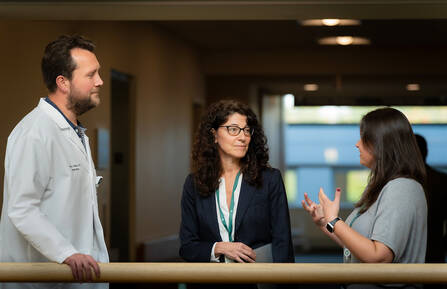
So now, all of a sudden we're thinking about earlier diagnosis in even primary care.
Neuropsychologist Karen E. Blackmon, PhD, site director of Dartmouth Health’s Brain Health Navigator programCan Alzheimer’s be prevented?
New findings suggest that the brain disease that causes memory loss, cognitive decline, and behavioral changes can be slowed and, in some cases, even avoided altogether.
“Papers that have come out in the 2024 Lancet Commission show that we can reduce the rates of dementia by addressing modifiable factors in middle age,” says Karen E. Blackmon, PhD, a neuropsychologist and site director of Dartmouth Health’s Brain Health Navigator program, which is part of the Davos Alzheimer’s Collaborative (DAC).
In other words, she says, modifiable factors can lessen your likelihood of getting Alzheimer’s disease and there is also growing research on how to better diagnose, slow, and treat it.
What is Alzheimer’s?
Alzheimer's is a progressive brain disease that causes memory loss, cognitive decline, and behavioral changes, and it usually develops when people are aged 65 years or older.
It is the most common form of dementia, which is a general term for a decline in mental ability severe enough to interfere with daily life. According to the Alzheimer’s Association, more than seven million Americans are living with the disease. About one in nine people aged 65 and older have it.
What does Alzheimer’s do to the brain?
Alzheimer’s damages and destroys essential nerve cells in the brain (called neurons). The neurons damaged first are in parts of the brain responsible for memory, language, and thinking, which is why the first symptoms of Alzheimer’s disease tend to be memory, language and thinking (or cognitive) problems.
Individuals may also develop changes in mood, personality, or behavior, such as apathy, confusion and increased suspicion and fear.
What has changed in scientists' understanding of Alzheimer’s?
Broadly speaking, Blackmon points to three important developments related to scientists’ understanding of Alzheimer’s.
- It has modifiable risk factors.
- Diagnosis is possible through a blood test, cognitive assessment, and other methods.
- It can be treated.
What are the so-called modifiable risk factors that can help prevent or slow the development of Alzheimer’s?
The 2024 Lancet Commission report lists 14 modifiable risk factors that, if eliminated, can help prevent Alzheimer’s and other forms of dementia. These are:
- Less education
- Head injury
- Physical inactivity
- Smoking
- Excessive alcohol consumption
- Hypertension
- Obesity
- Diabetes
- Hearing loss
- Depression
- Vision loss
- Infrequent social contact
- Air pollution
- High cholesterol.
Put together, addressing these factors in midlife can reduce the risk of Alzheimer's disease by up to 45 percent, says Blackmon.
How should you go about tackling these risks?
“Be proactive,” says Blackmon.
This is especially true in midlife when you can take recommended antihypertensive medication if you have high blood pressure; treat sleep apnea; address diabetes; not smoke; and keep alcohol consumption down.
If you are experiencing vision loss, studies show that dementia cases may be prevented with improved eye care.
Likewise, if you are starting to experience hearing loss, get a hearing aid, because studies have found that hearing aids slow cognitive decline in people at high risk.
Also, as you age, avoid becoming socially isolated.
“Social contact in any form has a potentially beneficial effect on dementia risk by building cognitive reserve, promoting healthy behaviors, and reducing stress and inflammation of the brain,” reports the Lancet 2024 Commission.
A recent piece in The New York Times about "Super-Agers" also suggests that people who socialize more are more resistant to cognitive decline as they get older.
“People with healthy lifestyles, involving regular exercise, not smoking, avoiding excess alcohol, and including cognitive activity in late life, were shown not only to have a lower risk of dementia than those with less healthy lifestyles but also to have dementia onset delayed for longer than their increased life expectancy, resulting in more healthy years and fewer years of illness,” reported the Lancet 2024 Commission.
How much of a role do genetics play?
Research shows that family history is the second strongest risk factor for Alzheimer’s following advanced age, and that gene mutations and variations of a gene called Apolipoprotein E (APOE) can make you more susceptible to Alzheimer’s as you age.
“APOE is involved in things like inflammation that can make you, for example, more susceptible to accelerated brain aging,” says Blackmon. “So, if you have genetic risk, you just may have to be a little bit more assertive about managing modifiable factors like high cholesterol and hypertension,” she says.
She also points out that an anti-inflammatory diet, like the Mediterranean diet, reduces risk of Alzheimer’s, even in someone who has a genetic predisposition.
If you think you might have the disease, what should you do?
Tell your doctor.
Typically, it's either you or a family member who notices a change in your memory, but to be classified as Alzheimer’s, that change needs to be clinically significant and sustained.
“If you are thinking, I forgot where I put my keys, I left them in the car. That’s not a big deal. But if you’re noticing every day that you can't remember where you parked, or if you can't remember loved ones who recently called, appointments or medications, that could be Alzheimer’s,” says Blackmon.
An inability to use language or to recognize common objects or even loved ones also can be Alzheimer’s.
How is Alzheimer’s diagnosed?
First, you will have a short assessment of cognition test to determine if you have clinically meaningful cognitive change.
The U.S. Food and Drug Administration (FDA) has also recently approved a blood test, which is not yet widely available but should be soon. The blood test can determine whether or not your brain has the amyloid protein that is associated with Alzheimer’s.
Blood testing is a significant development because, in the past, diagnosis required a lumbar puncture or brain scan, which is more expensive and invasive.
“So now, all of a sudden we're thinking about earlier diagnosis in even primary care,” says Blackmon.
What is treatment?
In addition to addressing risk-modifying factors, there is now treatment that is disease-modifying, meaning it directly treats the disease by targeting amyloid proteins.
When started early, the treatment can have a significant impact on delaying the progression of the disease.
Other forms of possible treatment are on the horizon. For example, a study recently published in Nature found that lithium loss in the human brain is one of the earliest changes leading to Alzheimer’s. The study also found that a lithium compound restored memory in mice through avoiding capture by amyloid proteins.
What is new at Dartmouth Health in helping people with Alzheimer’s?
Dartmouth Health is among six sites participating in the DAC’s Brain Health Navigator program. Under the pilot program, Advanced Professions Practitioners (APPs) are trained to become Brain Health Navigators, helping patients and their families navigate their way through diagnosis and treatment.
“Two program goals are to be able to give an early diagnosis and to help patients be assertive in addressing brain health risk factors,” says Blackmon.
Once a primary care doctor identifies someone as being at risk of Alzheimer’s through screening, the primary care doctor can refer the patient to the Brain Health Navigator (BHN) in Geriatric Psychiatry.
“The BHN then does a more thorough evaluation and looks for any modifiable reversible factors. Neuropsychological testing helps to characterize the full cognitive profile. Right now, blood tests are not yet covered by insurance. But as soon as they're available, we'll also include them and then we can determine whether people may benefit from newer treatments or whether they actually need to just focus on their brain health,” says Blackmon.
Caring for someone with Alzheimer’s
If you or your loved one is diagnosed with Alzheimer’s, Blackmon says it is important for both patients and loved ones to learn to be in the moment.
“Quality of life can stay high if people focus on the here and now. You can still have attachment, love for others, and connection,” says Blackmon. “But if we're attached to having a sharp memory, to achievement, to all these things that meant so much earlier in life, it can be quite painful.”
To learn more about what you can do to stay healthy as you age and on caring for aging loved ones, Blackmon also recommends getting in touch with the Geriatric Center of Excellence.




